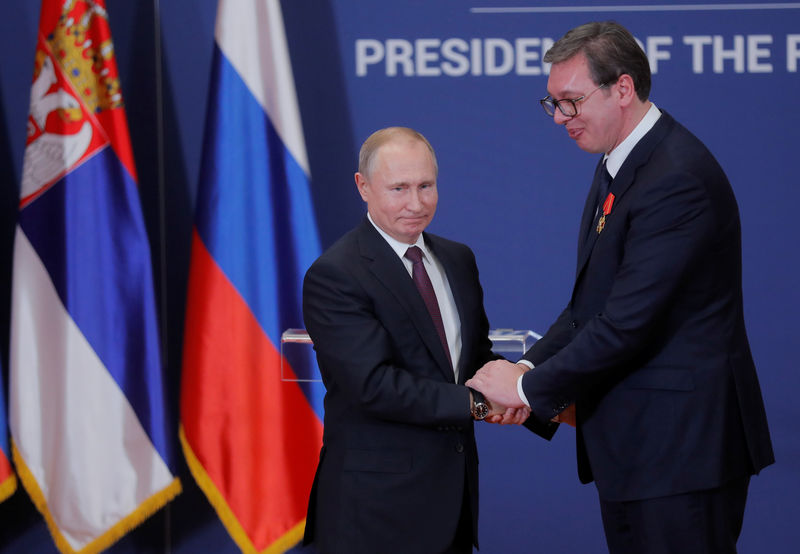By Aleksandar Vasovic
BELGRADE (Reuters) - Serbian President Aleksandar Vucic ordered an investigation on Wednesday into a video clip that purportedly shows a Russian intelligence officer handing over money to a Serbian man, in an incident that could strain normally warm bilateral relations.
A Bulgaria-based investigative reporter, Christo Grozev, said on his Twitter account at the weekend that the clip, posted on YouTube, showed the assistant military attache at Russia's embassy in Belgrade meeting a Serbian agent in a sting operation.
https://twitter.com/christogrozev/status/1196184389656424450
Grozev said he used Microsoft (NASDAQ:MSFT) face-recognition software to identify the Russian man who wears a black leather jacket. https://www.youtube.com/watch?v=yawNh1SwYts
The clip shows the two men warmly greeting each other in Belgrade, drinking beer and exchanging plastic bags. The Serb, whose face is obscured, later sits in a car, takes an envelope from the bag and counts out the banknotes it contains.
Russian officials in Moscow and Belgrade could not be immediately reached for comment.
Announcing the president's decision to order an investigation, Serbia's Prime Minister Ana Brnabic told the Serbian daily Blic: "If this turns out to be true, this would be a serious matter and a problem for us."
Serbia's Security and Information Agency (BIA) has confirmed the authenticity of the video, the state Tanjug news agency said. More information will be made public after Serbia's national Security Council meets on Thursday, Tanjug added.
The office of Serbian Interior Minister Nebojsa Stefanovic said he had traveled to Moscow on Wednesday for talks on "security challenges" and "cooperation in combating crime" with the head of Russia's Security Council, Nikolai Patrushev. It did not say whether the trip was connected to the video.
Last month, Sergey Naryshkin, the head of Russia's Foreign Intelligence Service (SVR) said the two countries were performing "complex mutual operations" to protect their external interests, without elaborating.
Russia and Serbia, both Slavic, majority Orthodox Christian countries, have strong political, cultural and economic ties. Moscow backs Belgrade in refusing to recognize the independence of Kosovo, a former Serbian province.
Serbia's armed forces use Russian technology, jet fighters and tanks. Serbia recently acquired Russia's Pantsyr anti-aircraft weapon system, risking sanctions from the United States.

Serbia is also dependent on Russian oil and gas, and the largest local oil company, Naftna Industrija Srbije, is majority-owned by Russia’s Gazprom (MCX:GAZP).